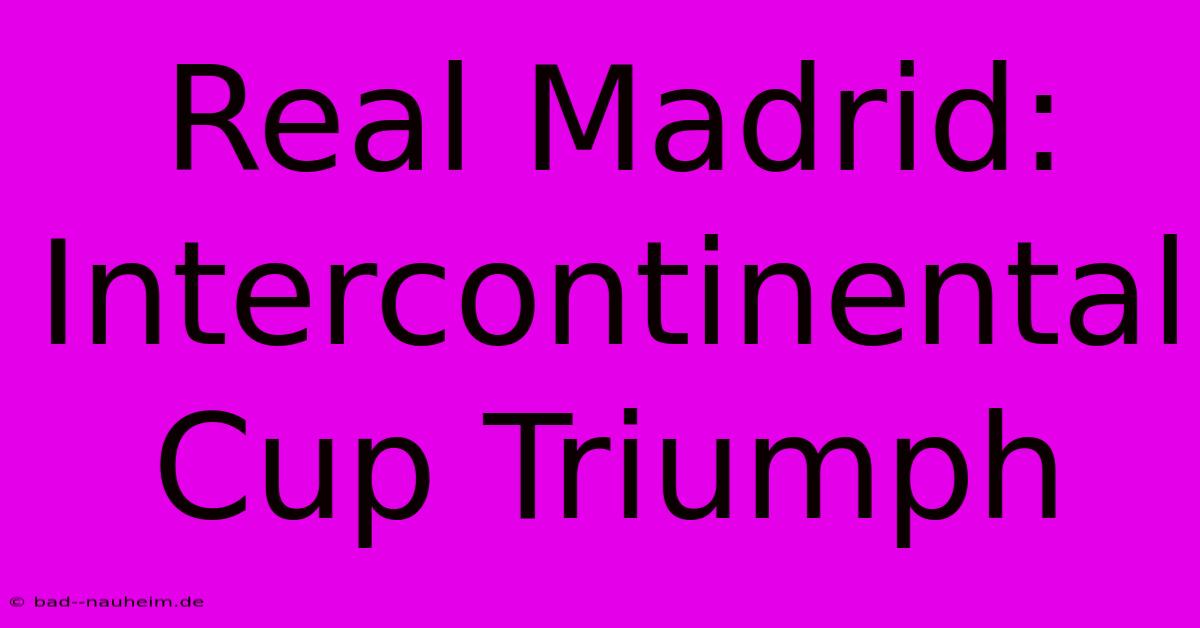Real Madrid: Intercontinental Cup Triumph

Discover more detailed and exciting information on our website. Click the link below to start your adventure: Visit My Website. Don't miss out!
Table of Contents
Real Madrid: A History of Intercontinental Cup Triumphs
Real Madrid, a name synonymous with footballing excellence, boasts a rich history filled with legendary players, iconic victories, and a trophy cabinet overflowing with silverware. Amongst their impressive collection, the Intercontinental Cup holds a special place, representing a period of global dominance and showcasing the club's prowess on the international stage. This article delves into Real Madrid's triumphant journey in this prestigious competition, exploring the significance of their wins and the legacy they've left behind.
The Dawn of Intercontinental Glory: 1960
The first Intercontinental Cup victory for Real Madrid arrived in 1960, a testament to their burgeoning reputation as a European powerhouse. Facing Peñarol of Uruguay, a team renowned for its strength and tactical acumen, Real Madrid displayed their characteristic attacking flair and defensive resilience. The two-legged final showcased the best of both teams, with moments of breathtaking skill and intense battles for possession. The eventual victory cemented Real Madrid's status as a true global giant, capable of conquering opponents from different continents and playing styles. This win marked a turning point in the club's history, signifying the beginning of their dominance on the world stage.
Key Players and Moments from 1960:
- Alfredo Di Stéfano's leadership was instrumental in guiding the team to victory. His experience and goalscoring ability proved invaluable.
- The tactical battle between the two coaches was a captivating aspect of the final.
- The unwavering support from Real Madrid fans both in Madrid and across the globe played a significant role in the team's success.
Further Conquests: The 1998 and 2002 Victories
Real Madrid's success in the Intercontinental Cup wasn't limited to a single victory. The club went on to claim the title twice more, in 1998 and 2002, demonstrating their enduring ability to compete at the highest level against the world's best. These victories showcased the club's adaptability and their capacity to evolve with the changing landscape of football. Each win represented a different era, different players, and a different playing style, but the underlying theme of excellence and determination remained constant.
1998: A New Generation Emerges
The 1998 victory against Vasco da Gama marked the emergence of a new generation of Real Madrid stars. This triumph signified the club's continued success after a period of rebuilding and showcased the club's ability to maintain its global dominance despite the inevitable changes in personnel. The match was a display of technical brilliance and tactical mastery.
2002: The Galácticos Era
The 2002 Intercontinental Cup victory against Olimpia, further solidified the success of the “Galácticos” era. This victory, featuring stars like Zinedine Zidane, Ronaldo, and Roberto Carlos, cemented Real Madrid's place as the dominant force in world football at the time. The team's impressive array of talent overwhelmed their opponents and underlined the club’s strength in depth.
The Legacy of the Intercontinental Cup
Real Madrid's Intercontinental Cup wins hold a significant place in the club's history and the broader narrative of football. These victories highlight the club's global appeal, its ability to attract and develop top talent from around the world, and its commitment to success on the international stage. The memories and achievements associated with these matches continue to inspire current and future generations of Real Madrid players and fans alike. The legacy extends beyond the trophies themselves, encompassing the players, the matches, and the era of global domination it represents.
Conclusion
Real Madrid's Intercontinental Cup triumphs represent more than just three victories; they represent a legacy of global dominance, a testament to the club's enduring excellence, and a source of immense pride for fans worldwide. The achievements of these teams continue to inspire future generations, reminding us of Real Madrid's exceptional place in the history of football.

Thank you for visiting our website wich cover about Real Madrid: Intercontinental Cup Triumph. We hope the information provided has been useful to you. Feel free to contact us if you have any questions or need further assistance. See you next time and dont miss to bookmark.
Also read the following articles
| Article Title | Date |
|---|---|
| Brad Pitt 150 000 Euro Krypto Betrug | Dec 19, 2024 |
| A Nobis Insolvenz Der Sektkellerei | Dec 19, 2024 |
| Schwacher Nasdaq 100 Am Abend | Dec 19, 2024 |
| Mufasa Ist Der Film Einen Kinobesuch Wert | Dec 19, 2024 |
| Amazon Ausstand Verdi Ruft Zu Streiks Auf | Dec 19, 2024 |
